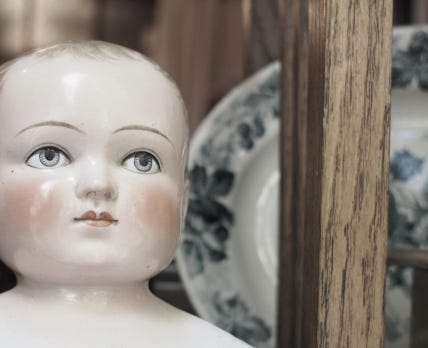All previous chapters are listed in order in the Bartle Clunes archive. Click here If you are new, please start here: Introduction to Bartle Clunes .
El Dorado County 1950
In keeping with the vagaries of life in this always uncertain world, the joyful celebration for Ayla was followed only two weeks later by the sad news that Mr. Riles had died. It was the first of May. The Clunes' attended his funeral along with every other ambulant resident of Riles Crossing. Ralph Riles had been a well-known, well-respected man in the community for over sixty-five years and would be truly missed.
His son, Lonnie, was inconsolable. He had known, of course, that his father hadn't long to live, and, in fact, had been sitting with him at the very moment of his passing, speaking with him, telling him how much he was loved. In his grief, he thought of closing down the store for a few days, but in the event, found it unbearable to be alone in that large house of his. He rattled around like a BB in a shoebox, and so he just went back to work.
Lonnie was born and raised in that house. It was the only home he'd ever known, and it had never felt so empty. He wandered from room to room picking up small things and setting them back down. His mother's pink lucite hairbrush. The chalk majorette doll she had won at the County Fair. Her small pillow with “Heart of My Heart” embroidered across the front. Her favorite old red sweater was still hanging in the closet, still smelling of wintergreen lotion. His father's things, now too, would become family relics – the pocket watch waiting unwound in the leather box on his dresser, his old worn shoes on the floor of the closet, a paperback on his nightstand opened to page 67, a mystery that now would not be solved.
Lonnie felt overwhelmed. Ayla went in to work with him to keep him company every day for a week. Louvina sent casseroles and desserts for lack of knowing how else to support him. She told him he had a standing invitation to drop in for supper at the Clunes every night of the week, as often as he liked. Bartle asked him if he would come help next Sunday to build a larger, sturdier pen for the goats. He could have done it by himself, but he thought maybe it would be a good distraction for the young man and a reminder that he still had “family”.
Both Ayla and Lonnie attained their adulthood in the spring of 1950. Though she would never admit it to others, Ayla knew that she had talent and she had skills. She believed she had the intelligence to make decisions for herself and the ability to support herself in this world. She was creative and hard-working, and most importantly, she knew she was not only loved by Louvina and Bartle, but was an important contributing member of the family. She held up an equal end of the triangle and never questioned it. She also knew that the next time Lonnie asked her to marry him, she would say yes.
Lonnie, too, was coming into his own. He was young and strong. He knew what he wanted in this life, and it was not anything particularly unusual. He wanted to continue providing friendly service to the people of Riles Crossing. He wanted an intelligent, cheerful wife, and could only see the face of Ayla Clunes. He hoped some day to be a good, stable father like his own father was for him. That was the extent of his dreams.
Lonnie's confidence in his business abilities grew out of necessity. He was now the sole proprietor of the general store at age twenty-one. He shivered to think of it. He wanted to manage it as well as his father had, and his grandfather before that. The sign over the porch of his establishment had always said 'Riles Crossing General Store and Hardware'. He had Ayla amend it by painting underneath in small letters 'Est. 1889' and 'L. Riles, Prop.'. It was an affirmation of pride in his family's long history in the area and a promise to the foothills folk that he had taken up the reins and would not let them down.
Lonnie Riles looked around his big old house and saw for the first time what a mess it had become, full of generations of unneeded, unused things, randomly stuck here and there. He admitted to Ayla that the house had not been thoroughly cleaned or changed since his mother had died last spring, and he was embarrassed about it.
Ayla and Louvina offered to help him, and after an appropriate amount of half-hearted protest, he agreed to it. They jumped in with gusto. First they had him go through things and choose the keepsakes and treasures he would not want to part with. As it turned out, he was not a keeper. He was like Bartle — his pleasure was not found in things, but rather in ideas, in people, in work. He kept a few small objects that held memories, but generally had no trouble letting go of most of it, which made the work go quickly. They emptied out the closets and drawers of anything that Lonnie did not need or want, and donated them to those who did. They filled seven boxes to take to the Salvation Army. A few more were bound for the dump.
Then the women organized and cleaned that house top to bottom, scrubbing everything, wiping down cobwebs from all the corners with a damp towel draped over a broom, hanging the rugs out on the line and giving them a vigorous beating. It took them three full days, and when they were done they leaned on their brooms and mops and were satisfied.
“This has been good for my soul,” said Louvina, removing the dish towel she had wound around her head.
“Mine, too,” Ayla agreed, brushing the dust from her hands and throwing her arms around her step-mother.
“Mine, too,” said Lonnie, enfolding his arms around both women at one time. “I can breathe in here now. It is like a brand new start,” he said.











Such is the way of things. Generations come and go. But life carries on.